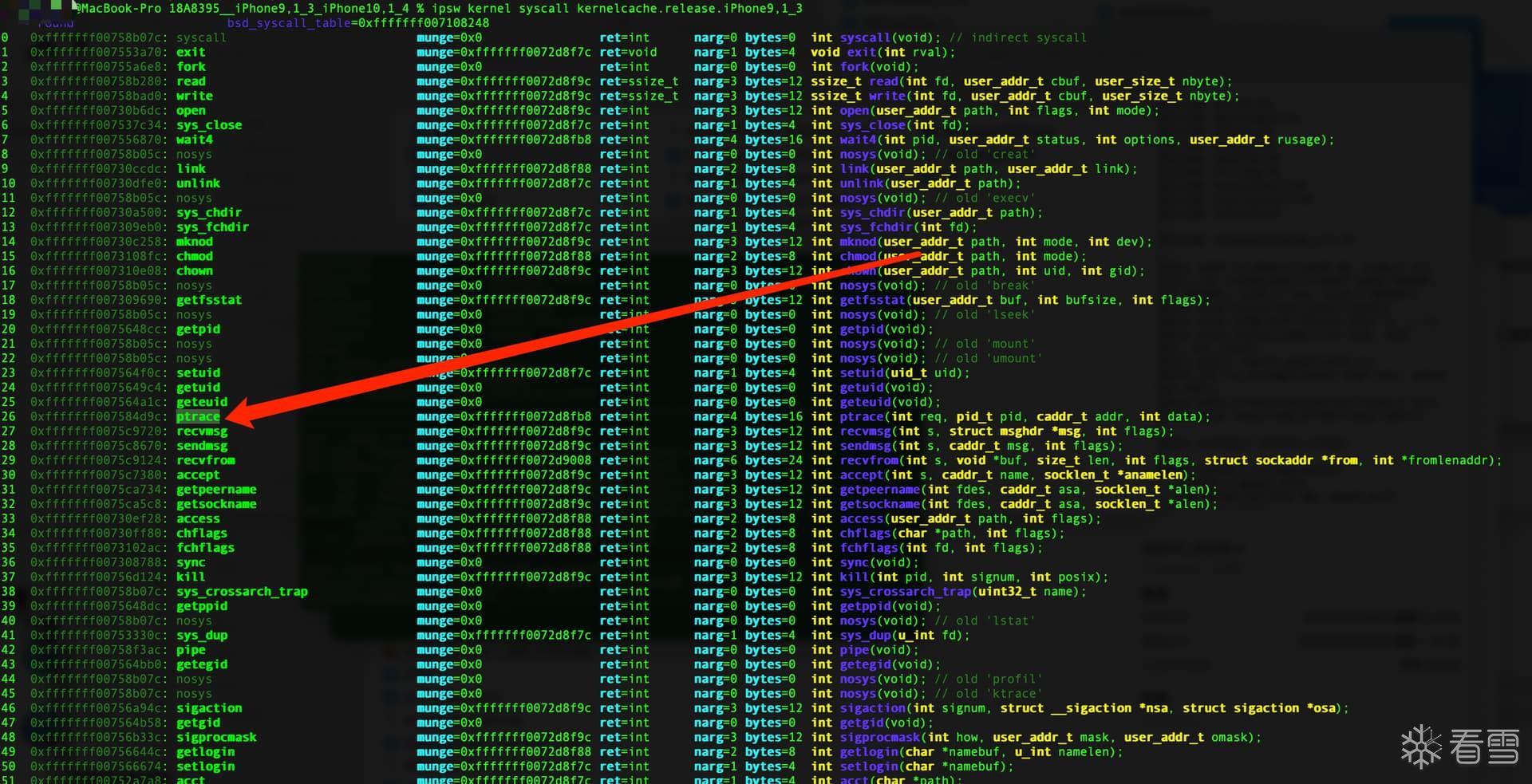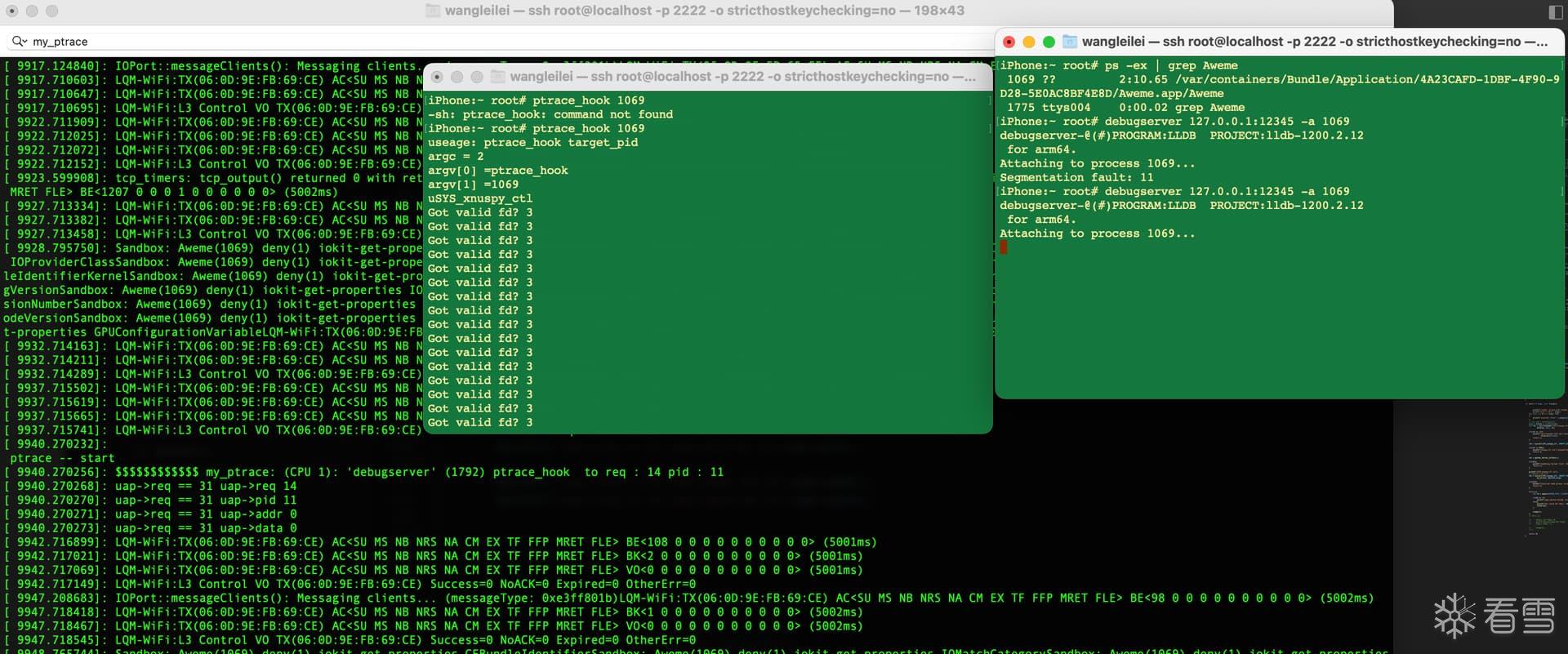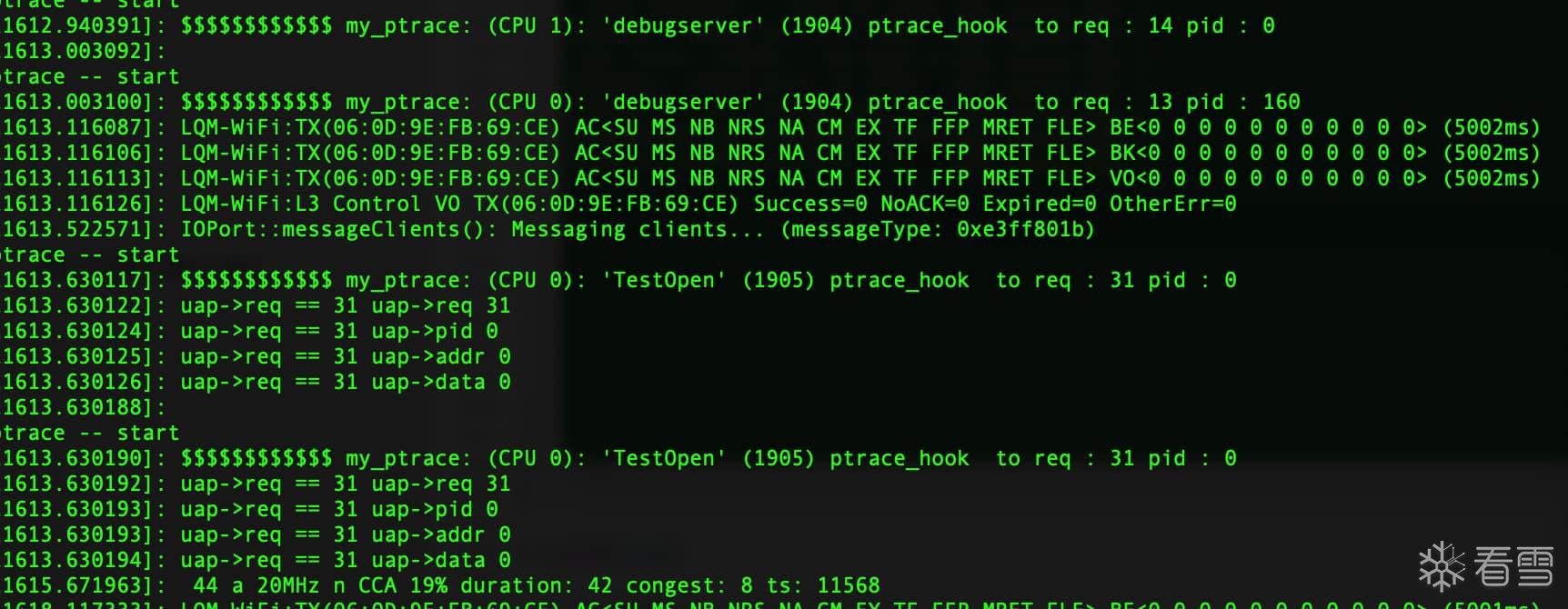首页/文章/IOS安全/iOS安全-通过xnuspy hook 内核ptrace 函数绕过反调试/
iOS安全-通过xnuspy hook 内核ptrace 函数绕过反调试
推荐 原创【iOS安全-通过xnuspy hook 内核ptrace 函数绕过反调试】此文章归类为:iOS安全。
昨天实践了修改kernproc 结构体绕过反调试.今天突然想到是不是直接内核hook 更方便点儿
0x01先阅读自己手机系统iPhone 7 的 14.1对应的xnu开源代码里面的ptrace代码
- xnu-xnu-7195.50.7.100.1/bsd/kern/mach_process.c
1 2 3 4 5 6 7 8 9 10 11 12 13 14 15 16 17 18 19 20 21 22 23 24 25 26 27 28 29 30 31 32 33 34 35 36 37 38 39 40 41 42 43 44 45 46 47 48 49 50 51 52 53 54 55 56 57 58 59 60 61 62 63 64 65 66 67 68 69 70 71 72 73 74 75 76 77 78 79 80 81 82 83 84 85 86 87 88 89 90 91 92 93 94 95 96 97 98 99 100 101 102 103 104 105 106 107 108 109 110 111 112 113 114 115 116 117 118 119 120 121 122 123 124 125 126 127 128 129 130 131 132 133 134 135 136 137 138 139 140 141 142 143 144 145 146 147 148 149 150 151 152 153 154 155 156 157 158 159 160 161 162 163 164 165 166 167 168 169 170 171 172 173 174 175 176 177 178 179 180 181 182 183 184 185 186 187 188 189 190 191 192 193 194 195 196 197 198 199 200 201 202 203 204 205 206 207 208 209 210 211 212 213 214 215 216 217 218 219 220 221 222 223 224 225 226 227 228 229 230 231 232 233 234 235 236 237 238 239 240 241 242 243 244 245 246 247 248 249 250 251 252 253 254 255 256 257 258 259 260 261 262 263 264 265 266 267 268 269 270 271 272 273 274 275 276 277 278 279 280 281 282 283 284 285 286 287 288 289 290 291 292 293 294 295 296 297 298 299 300 301 302 303 304 305 306 307 308 309 310 311 312 313 314 315 316 317 318 319 320 321 322 323 324 325 326 327 328 329 330 331 332 333 334 335 336 337 338 339 340 341 342 343 344 345 346 347 348 349 350 351 352 353 354 355 356 357 358 359 360 361 362 363 364 365 366 367 368 369 370 371 372 373 374 375 376 377 378 379 380 381 382 383 | intptrace(struct proc *p, struct ptrace_args *uap, int32_t *retval){ struct proc *t; /* target process */ task_t task; thread_t th_act; struct uthread *ut; int tr_sigexc = 0; int error = 0; int stopped = 0; AUDIT_ARG(cmd, uap->req); AUDIT_ARG(pid, uap->pid); AUDIT_ARG(addr, uap->addr); AUDIT_ARG(value32, uap->data); if (uap->req == PT_DENY_ATTACH) {#if (DEVELOPMENT || DEBUG) && !defined(XNU_TARGET_OS_OSX) if (PE_i_can_has_debugger(NULL)) { return 0; }#endif proc_lock(p); if (ISSET(p->p_lflag, P_LTRACED)) { proc_unlock(p); KERNEL_DEBUG_CONSTANT(BSDDBG_CODE(DBG_BSD_PROC, BSD_PROC_FRCEXIT) | DBG_FUNC_NONE, p->p_pid, W_EXITCODE(ENOTSUP, 0), 4, 0, 0); exit1(p, W_EXITCODE(ENOTSUP, 0), retval); thread_exception_return(); /* NOTREACHED */ } SET(p->p_lflag, P_LNOATTACH); proc_unlock(p); return 0; } if (uap->req == PT_FORCEQUOTA) { if (kauth_cred_issuser(kauth_cred_get())) { t = current_proc(); OSBitOrAtomic(P_FORCEQUOTA, &t->p_flag); return 0; } else { return EPERM; } } /* * Intercept and deal with "please trace me" request. */ if (uap->req == PT_TRACE_ME) {retry_trace_me: ; proc_t pproc = proc_parent(p); if (pproc == NULL) { return EINVAL; }#if CONFIG_MACF /* * NB: Cannot call kauth_authorize_process(..., KAUTH_PROCESS_CANTRACE, ...) * since that assumes the process being checked is the current process * when, in this case, it is the current process's parent. * Most of the other checks in cantrace() don't apply either. */ struct proc_ident p_ident = proc_ident(p); struct proc_ident pproc_ident = proc_ident(pproc); kauth_cred_t pproc_cred = kauth_cred_proc_ref(pproc); proc_rele(pproc); error = mac_proc_check_debug(&pproc_ident, pproc_cred, &p_ident); kauth_cred_unref(&pproc_cred); if (error != 0) { return error; } if (proc_find_ident(&pproc_ident) == PROC_NULL) { return ESRCH; }#endif proc_lock(p); /* Make sure the process wasn't re-parented. */ if (p->p_ppid != pproc->p_pid) { proc_unlock(p); proc_rele(pproc); goto retry_trace_me; } SET(p->p_lflag, P_LTRACED); /* Non-attached case, our tracer is our parent. */ p->p_oppid = p->p_ppid; proc_unlock(p); /* Child and parent will have to be able to run modified code. */ cs_allow_invalid(p); cs_allow_invalid(pproc); proc_rele(pproc); return error; } if (uap->req == PT_SIGEXC) { proc_lock(p); if (ISSET(p->p_lflag, P_LTRACED)) { SET(p->p_lflag, P_LSIGEXC); proc_unlock(p); return 0; } else { proc_unlock(p); return EINVAL; } } /* * We do not want ptrace to do anything with kernel or launchd */ if (uap->pid < 2) { return EPERM; } /* * Locate victim, and make sure it is traceable. */ if ((t = proc_find(uap->pid)) == NULL) { return ESRCH; } AUDIT_ARG(process, t); task = t->task; if (uap->req == PT_ATTACHEXC) {#pragma clang diagnostic push#pragma clang diagnostic ignored "-Wdeprecated-declarations" uap->req = PT_ATTACH; tr_sigexc = 1; } if (uap->req == PT_ATTACH) {#pragma clang diagnostic pop int err;#if !defined(XNU_TARGET_OS_OSX) if (tr_sigexc == 0) { error = ENOTSUP; goto out; }#endif if (kauth_authorize_process(proc_ucred(p), KAUTH_PROCESS_CANTRACE, t, (uintptr_t)&err, 0, 0) == 0) { /* it's OK to attach */ proc_lock(t); SET(t->p_lflag, P_LTRACED); if (tr_sigexc) { SET(t->p_lflag, P_LSIGEXC); } t->p_oppid = t->p_ppid; /* Check whether child and parent are allowed to run modified * code (they'll have to) */ proc_unlock(t); cs_allow_invalid(t); cs_allow_invalid(p); if (t->p_pptr != p) { proc_reparentlocked(t, p, 1, 0); } proc_lock(t); if (get_task_userstop(task) > 0) { stopped = 1; } t->p_xstat = 0; proc_unlock(t); psignal(t, SIGSTOP); /* * If the process was stopped, wake up and run through * issignal() again to properly connect to the tracing * process. */ if (stopped) { task_resume(task); } error = 0; goto out; } else { error = err; if (error == ESRCH) { /* * The target 't' is not valid anymore as it * could not be found after the MAC check. */ return error; } /* not allowed to attach, proper error code returned by kauth_authorize_process */ if (ISSET(t->p_lflag, P_LNOATTACH)) { psignal(p, SIGSEGV); } goto out; } } /* * You can't do what you want to the process if: * (1) It's not being traced at all, */ proc_lock(t); if (!ISSET(t->p_lflag, P_LTRACED)) { proc_unlock(t); error = EPERM; goto out; } /* * (2) it's not being traced by _you_, or */ if (t->p_pptr != p) { proc_unlock(t); error = EBUSY; goto out; } /* * (3) it's not currently stopped. */ if (t->p_stat != SSTOP) { proc_unlock(t); error = EBUSY; goto out; } /* * Mach version of ptrace executes request directly here, * thus simplifying the interaction of ptrace and signals. */ /* proc lock is held here */ switch (uap->req) { case PT_DETACH: if (t->p_oppid != t->p_ppid) { struct proc *pp; proc_unlock(t); pp = proc_find(t->p_oppid); if (pp != PROC_NULL) { proc_reparentlocked(t, pp, 1, 0); proc_rele(pp); } else { /* original parent exited while traced */ proc_list_lock(); t->p_listflag |= P_LIST_DEADPARENT; proc_list_unlock(); proc_reparentlocked(t, initproc, 1, 0); } proc_lock(t); } t->p_oppid = 0; CLR(t->p_lflag, P_LTRACED); CLR(t->p_lflag, P_LSIGEXC); proc_unlock(t); goto resume; case PT_KILL: /* * Tell child process to kill itself after it * is resumed by adding NSIG to p_cursig. [see issig] */ proc_unlock(t);#if CONFIG_MACF error = mac_proc_check_signal(p, t, SIGKILL); if (0 != error) { goto resume; }#endif psignal(t, SIGKILL); goto resume; case PT_STEP: /* single step the child */ case PT_CONTINUE: /* continue the child */ proc_unlock(t); th_act = (thread_t)get_firstthread(task); if (th_act == THREAD_NULL) { error = EINVAL; goto out; } /* force use of Mach SPIs (and task_for_pid security checks) to adjust PC */ if (uap->addr != (user_addr_t)1) { error = ENOTSUP; goto out; } if ((unsigned)uap->data >= NSIG) { error = EINVAL; goto out; } if (uap->data != 0) {#if CONFIG_MACF error = mac_proc_check_signal(p, t, uap->data); if (0 != error) { goto out; }#endif psignal(t, uap->data); } if (uap->req == PT_STEP) { /* * set trace bit * we use sending SIGSTOP as a comparable security check. */#if CONFIG_MACF error = mac_proc_check_signal(p, t, SIGSTOP); if (0 != error) { goto out; }#endif if (thread_setsinglestep(th_act, 1) != KERN_SUCCESS) { error = ENOTSUP; goto out; } } else { /* * clear trace bit if on * we use sending SIGCONT as a comparable security check. */#if CONFIG_MACF error = mac_proc_check_signal(p, t, SIGCONT); if (0 != error) { goto out; }#endif if (thread_setsinglestep(th_act, 0) != KERN_SUCCESS) { error = ENOTSUP; goto out; } }resume: proc_lock(t); t->p_xstat = uap->data; t->p_stat = SRUN; if (t->sigwait) { wakeup((caddr_t)&(t->sigwait)); proc_unlock(t); if ((t->p_lflag & P_LSIGEXC) == 0) { task_resume(task); } } else { proc_unlock(t); } break; case PT_THUPDATE: { proc_unlock(t); if ((unsigned)uap->data >= NSIG) { error = EINVAL; goto out; } th_act = port_name_to_thread(CAST_MACH_PORT_TO_NAME(uap->addr), PORT_TO_THREAD_NONE); if (th_act == THREAD_NULL) { error = ESRCH; goto out; } ut = (uthread_t)get_bsdthread_info(th_act); if (uap->data) { ut->uu_siglist |= sigmask(uap->data); } proc_lock(t); t->p_xstat = uap->data; t->p_stat = SRUN; proc_unlock(t); thread_deallocate(th_act); error = 0; } break; default: proc_unlock(t); error = EINVAL; goto out; } error = 0;out: proc_rele(t); return error;} |
- 通过阅读源码发现只需要修改第二个参数的结构体属性uap->req 就可以达到绕过目的 (uap->req == PT_DENY_ATTACH)
定位内核ptrace函数偏移地址

分析第二个参数ptrace_args的内部结构
让我们详细分析 struct ptrace_args 在内存中的布局。在 64 位系统上,考虑到内存对齐和每个成员的大小,下面是详细的内存布局。
假设 pid_t 是 4 字节,user_addr_t 是 8 字节。在 64 位系统上,指针类型通常是 8 字节并且需要对齐到 8 字节边界。
首先,结构体定义如下:
1 2 3 4 5 6 7 | struct ptrace_args { int req; // 4 bytes void * unknow[4]; //和实际内存的中偏移不符.实际pid 是+8,所以加了unknow填充 pid_t pid; // 4 bytes user_addr_t addr;// 8 bytes (on a 64-bit system) int data; // 4 bytes}; |
内存布局和对齐分析:
int req:- 大小: 4 bytes
- 对齐: 4 bytes
- 偏移: 0
- 结束偏移: 4
pid_t pid:- 大小: 4 bytes
- 对齐: 4 bytes
- 偏移: 4(紧接在
req之后) - 结束偏移: 8
user_addr_t addr:- 大小: 8 bytes
- 对齐: 8 bytes
- 由于
addr需要 8 字节对齐,而当前偏移 8 已经对齐到 8 字节边界,因此无需填充 - 偏移: 8
- 结束偏移: 16
int data:- 大小: 4 bytes
- 对齐: 4 bytes
- 偏移: 16(紧接在
addr之后) - 结束偏移: 20
由于数据对齐要求,编译器可能会在结构体的末尾添加填充以确保结构体大小是对齐的。因此,整个结构体的大小是 24 字节(4 + 4 + 8 + 4 + 4(填充))。
详细内存布局:
1 2 3 4 5 6 7 8 9 | +-------------+--------------+--------------+--------------+| req (4 bytes) | unknow (4 bytes) |+-------------+--------------+--------------+--------------+| pid (4 bytes) | padding (4 bytes) |+-------------+--------------+--------------+--------------+| addr (8 bytes) |+-------------+--------------+--------------+--------------+| data (4 bytes) | padding (4 bytes) |+-------------+--------------+--------------+--------------+ |
解释:
req占用偏移 0 到 3。unknow紧接其后,占用偏移 4 到 7。pid占用偏移 8 到 15。
这就是 struct ptrace_args 在内存中的布局。
编写代码
1 2 3 4 5 6 7 8 9 10 11 12 13 14 15 16 17 18 19 20 21 22 23 24 25 26 27 28 29 30 31 32 33 34 35 36 37 38 39 40 41 42 43 44 45 46 47 48 49 50 51 52 53 54 55 56 | static int (*ptrace_orig)(struct proc *p, struct ptrace_args *uap, int32_t *retval);static int my_ptrace(struct proc *p, struct ptrace_args *uap, int32_t *retval){ kprintf("\n ptrace -- start \n"); uint8_t cpu = curcpu(); pid_t caller = caller_pid(); char *caller_name = unified_kalloc(MAXCOMLEN + 1); if(!caller_name){ kprintf("\n ptrace -- caller_name \n"); return ptrace_orig(p,uap,retval); } /* proc_name doesn't bzero for some version of iOS 13 */ _bzero(caller_name, MAXCOMLEN + 1); proc_name(caller, caller_name, MAXCOMLEN + 1); kprintf("$$$$$$$$$$$$ %s: (CPU %d): '%s' (%d) ptrace_hook to req : %d pid : %d \n", __func__, cpu, caller_name, caller,uap->req,uap->pid); unified_kfree(caller_name); if (uap->req == 31 || uap->req == 14) { /* code */ kprintf("uap->req == 31 uap->req %d \n",uap->req); kprintf("uap->req == 31 uap->pid %d \n",uap->pid); kprintf("uap->req == 31 uap->addr %d \n",uap->addr); kprintf("uap->req == 31 uap->data %d \n",uap->data); return 0; } return ptrace_orig(p,uap,retval);} /* iPhone 7 14.1 */ //FFFFFFF007584D9C ret = syscall(SYS_xnuspy_ctl, XNUSPY_INSTALL_HOOK, 0xFFFFFFF007584D9C, my_ptrace, &ptrace_orig); |
还是拿宇宙最强App 抖音测试下 . 成功!

测试下自己的app
1 2 3 4 5 6 7 8 9 10 11 12 13 14 15 16 17 18 19 20 21 22 23 24 25 26 27 28 29 30 31 32 33 34 35 36 37 38 | void antiDebug() { // ARM syscall to invoke ptrace with PT_DENY_ATTACH #ifdef __arm64__ asm volatile( "mov x0,#26\n" "mov x1,#31\n" "mov x2,#0\n" "mov x3,#0\n" "mov x16,#0\n" "svc #128\n" );#endif __asm__ volatile( "mov x0, #31\n" // PT_DENY_ATTACH "mov x1, #0\n" "mov x2, #0\n" "mov x3, #0\n" "mov x8, #26\n" // syscall number for ptrace "svc #0x80\n" );}void antiDebug1() { typedef int (*ptrace_ptr_t)(int _request, pid_t _pid, caddr_t _addr, int _data);// ptrace(PT_DENY_ATTACH, 0, 0, 0); void *handle = dlopen(0, RTLD_GLOBAL | RTLD_NOW); ptrace_ptr_t ptrace_ptr = (ptrace_ptr_t)dlsym(handle, "ptrace"); ptrace_ptr(PT_DENY_ATTACH, 0, 0, 0);} |
运行app后也成功hook

最后于 4小时前
被yuzhouheike编辑
,原因:
更多【iOS安全-通过xnuspy hook 内核ptrace 函数绕过反调试】相关视频教程:www.yxfzedu.com
相关文章推荐
- 编程技术-为无源码的DLL增加接口功能 - Android安全CTF对抗IOS安全
- CTF对抗-Realworld CTF 2023 ChatUWU 详解 - Android安全CTF对抗IOS安全
- Android安全-frida源码编译详解 - Android安全CTF对抗IOS安全
- 软件逆向- PE格式:新建节并插入代码 - Android安全CTF对抗IOS安全
- 加壳脱壳- UPX源码学习和简单修改 - Android安全CTF对抗IOS安全
- 二进制漏洞-win越界写漏洞分析 CVE-2020-1054 - Android安全CTF对抗IOS安全
- Pwn-2022长城杯决赛pwn - Android安全CTF对抗IOS安全
- 软件逆向-Wibu Codemeter 7.3学习笔记——Codemeter服务端 - Android安全CTF对抗IOS安全
- Pwn-沙箱逃逸之google ctf 2019 Monochromatic writeup - Android安全CTF对抗IOS安全
- 软件逆向-Wibu Codemeter 7.3学习笔记——AxProtector壳初探 - Android安全CTF对抗IOS安全
- 企业安全-学习Kubernetes笔记——暴露站点服务(Ingress) - Android安全CTF对抗IOS安全
- 企业安全-学习Kubernetes笔记——部署数据库站点(MySql) - Android安全CTF对抗IOS安全
- 企业安全-学习Kubernetes笔记——部署web站点环境(PHP+Nginx) - Android安全CTF对抗IOS安全
- 企业安全-学习Kubernetes笔记——安装NFS驱动 - Android安全CTF对抗IOS安全
- 企业安全-学习Kubernetes笔记——kubeadm安装Kubernetes - Android安全CTF对抗IOS安全
- 软件逆向-wibu软授权(四) - Android安全CTF对抗IOS安全
- 软件逆向-使用IDAPython开发复制RVA的插件 - Android安全CTF对抗IOS安全
- 2-wibu软授权(三) - Android安全CTF对抗IOS安全
- 软件逆向-wibu软授权(二) - Android安全CTF对抗IOS安全
- 软件逆向-wibu软授权(一) - Android安全CTF对抗IOS安全
记录自己的技术轨迹
文章规则:
1):文章标题请尽量与文章内容相符
2):严禁色情、血腥、暴力
3):严禁发布任何形式的广告贴
4):严禁发表关于中国的政治类话题
5):严格遵守中国互联网法律法规
6):有侵权,疑问可发邮件至service@yxfzedu.com
近期原创 更多
- 笔记-【动手学深度学习】课程笔记 05-07 线性代数、矩阵计算和自动求导
- 安全-水利部加快推进小型水库除险加固,大坝安全监测是重点
- 微服务-Java版分布式微服务云开发架构 Spring Cloud+Spring Boot+Mybatis 电子招标采购系统功能清单
- 开发语言-怎么学编程效率高,编程练习网站编程软件下载,中文编程开发语言工具下载
- 安全-iPortal如何灵活设置用户名及密码的安全规则
- 集成测试-如何使用 Loadgen 来简化 HTTP API 请求的集成测试
- yolo-基于YOLOv8与DeepSORT实现多目标跟踪——算法与源码解析
- 编程技术-【机器学习】Kmeans聚类算法
- 集成学习-【Python机器学习】零基础掌握RandomForestRegressor集成学习
- java-LeetCode //C - 373. Find K Pairs with Smallest Sums